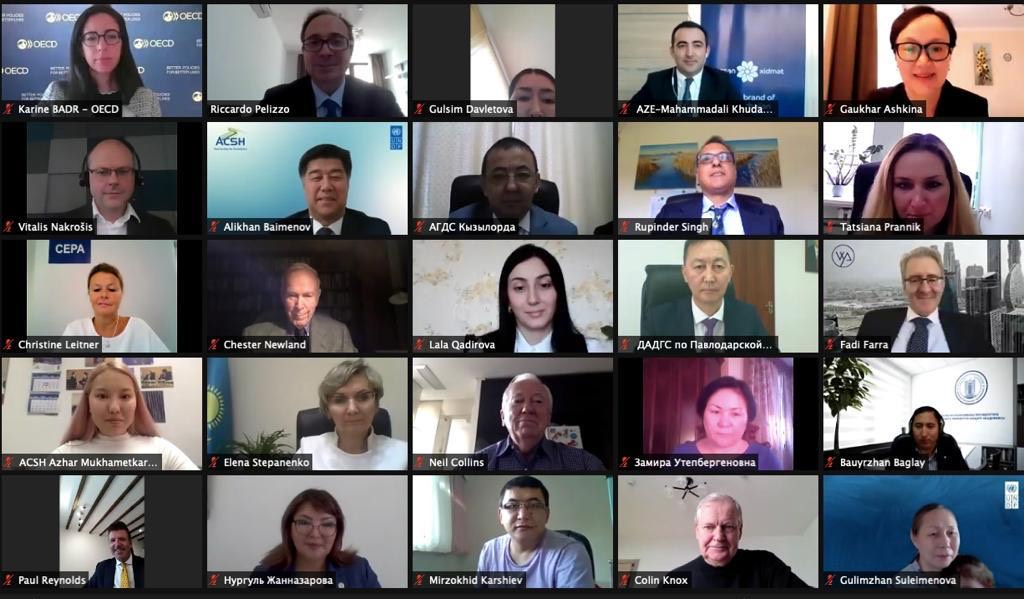Over 250 representatives of government agencies, international organizations, including the OECD, and universities from 20 countries of Europe, Asia and America participated in the panel session of the Astana Civil Service Hub on “Governance and Trust in a New Reality”, organized within the framework of the annual conference by the Graduate School of Public Policy (GSPP) of Nazarbayev University.
The subject of discussion was the issues of governance efficiency and the role of government communications in raising public trust in current conditions.
In his welcoming speech, the Chairman of the Steering Committee of the Astana Civil Service Hub Mr. Alikhan Baimenov noted that “the pandemic and a completely new reality it generated are placing increased demands on the quality of governance, which plays a crucial role in both immediate responses to new challenges and in the search for adequate recovery measures”. “Undoubtedly, this is accompanied by reconsideration of all government activities – from the reallocation of resources and functions and the application of best management practices to the accelerated use of information technologies and communication strategies” – said the Chairman of the ACSH. He further emphasized that “public trust is the key condition, which instills confidence in rationality of government strategies.
Chairperson of the Agency of the Republic of Kazakhstan for Civil Service Affairs Ms. Anar Zhailganova in her welcoming speech said that as in many other countries, the state apparatus of Kazakhstan was able to mobilize and restructure its work by taking into account the gained experience, and she briefly focused on the measures taken by the government of the country. She also emphasized that effective public administration and communication are key elements for the success of anti-crisis measures.
The UNDP Resident Representative in the Republic of Kazakhstan Mr. Yakup Beris noted that the crisis puts multiple pressures on the governments across the world. During these conditions, the UNDP in accordance with its mission in Kazakhstan has strongly supported the Government. Further, he highlighted: “now is the time to think about to meet long-term challenges and development priorities about how we can rebuild better and greener. This cannot be achieved without strong government systems in place.”
As the key speakers at the session were the Head of the Civil Service Bureau of Georgia Ms. Catherine Kardava, Co-founder and Global Managing Partner of Whiteshield Partners Mr. Fadi Farra, Senior Advisor and co-founder of the Center for Economics and Public Administration Ms. Christine Leitner, OECD Policy Analyst Ms. Karine Badr, Head of Division of the State Agency for Public Services and Social Innovation under the President of the Republic of Azerbaijan Mr. Mahammadali Khudaverdiyev, Professor of the Public Administration and Policy Analysis Center at Vilnius University Mr. Vitalis Nakrosis, as well as independent international experts Mr. Paul E. M. Reynolds and Mr. Rupinder Singh.
In particular, the representative of the OECD Ms. Karine Badr during the panel session presented the findings of the upcoming OECD’s first international report on public communication.
During the discussion, participants reviewed the impact of the COVID-19 on the transformation of public administration in various countries of the world, the need for trust, the role of effective and transparent communication in ensuring public trust, the basic principles of building a new society focused on citizens, and the transition to collaborative governance with the participation of all stakeholders.
The Hub’s mission is to assist in promoting civil service effectiveness by supporting the efforts of governments of the participating countries in building institutional and human capacity.
The Astana Civil Service Hub, established by the joint initiative of the Government of Kazakhstan and the United Nations Development Programme in 2013, currently includes 42 participating countries and 70 institutional partners. The Hub is an institutional platform for the exchange of experience and knowledge in the field of civil service with a flexible agenda that meets the needs of the participating countries
